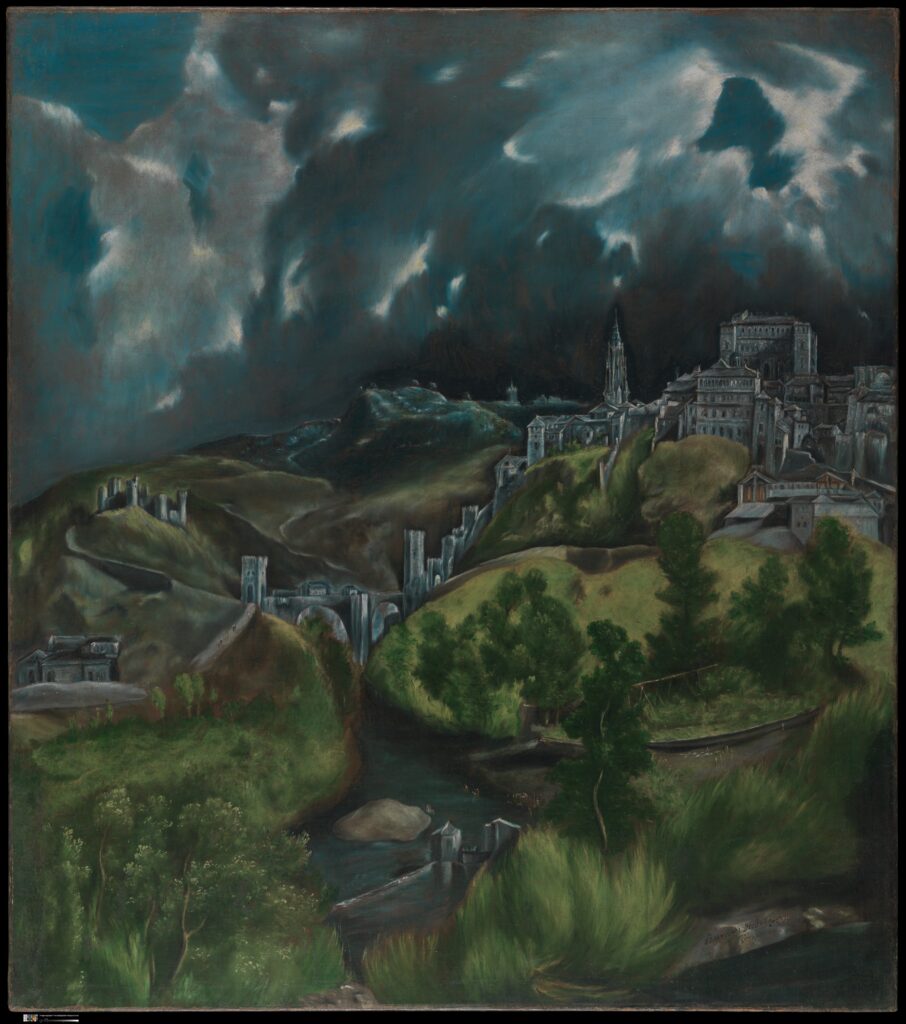
El Greco, View of Toledo
L’heure espagnole
Reviewed by David Truslove
‘My only mistress is music’, Maurice Ravel once remarked. Considering he was a private, even secretive composer who avoided relationships, his comic opera L’heure espagnole, with its central good-time girl, offers a rare glimpse into the composer’s humanity. The work’s sophisticated integration of Hispanic influences illustrates an affinity with Spain – inherited from his Basque-born mother. Perhaps the bawdy humour of Franc-Nohain’s 1904 play appealed to him. Whatever the attractions for Ravel, he created a wonderfully entertaining one act opera that has been superbly fashioned into a film by Grange Park Opera.
First performed at the Opéra-Comique in 1911 and originally set in 18th century Toledo, L’heure espagnole has been artfully relocated to London’s Church St. Kensington thanks to the initiative of Grange Park Opera and the ever-resourceful Wasfi Kani. She’s even provided the English surtitles. [Indeed, this work is the latest of fifty-one free to view on-line events presented by GPO in the past year.] No less enterprising is opera director Stephen Medcalf, whose film circumnavigated lockdown restrictions to enable singers to record their parts at the Wigmore Hall before miming them on location at the upmarket Howard Walwyn’s Fine Antique Clocks.
Of course, this comédie musicale about an adulterous clockmaker’s wife can be performed anywhere. Its tale is as ancient as Chaucer’s England or Caesar’s Rome. The work’s title is often translated as “The Spanish Hour”, a precious timeframe that adds no small degree of urgency to the amorous intrigues when clockmaker Torquemada is out servicing the city’s municipal clocks. His wife, Concepción, meanwhile hopes to entertain her lover, the self-obsessed poet Gonzalve. Plans go awry with the arrival of the delivery man Ramiro and then the wealthy banker Don Inigo Gomez. Concepción’s efforts to conceal one lover while she attempts to entertain another is the stuff of farce and she is finally rewarded with a compliant Ramiro as her prize. Little wonder one Parisian critic dubbed this work a ‘pornographic vaudeville’.
Unsurprisingly, the ticking of clocks permeates a work where the timing of the lovers’ antics is of the essence. Gratifyingly, clock-governed time dissolves in this fifty-five-minute production, which captivates in both its singing and characterisation. Close up camerawork by cinematographer Daniel Zafer guides our eye and enables a full appreciation of some superb acting where the curl of a lip, knowing glances or a raised eyebrow are wonderfully caught. There’s plenty of humour too, not least in the double entendres that might have come from any ‘Carry On’ film. ‘The mechanism is very fragile. Especially the pendulum’ is one such gag delivered with an impish grin straight to camera from Catherine Backhouse’s magnetic Concepción. It’s a role she sang with great aplomb in 2018 for Mid-Wales Opera. She is just as sassy here, with bags of personality and a sultry assurance that steals the show.
There are strong characterisations too from Elgan Llŷr Thomas’s versifying Gonzalve who seems more interested in fondling clock cases than Concepción. But there’s no lack of virility in his ringing tenor even if Ravel provides only a series of musical clichés. Ashley Riches convinces as the arrogant Iñigo, rich-toned and comical in his determined pursuit of pleasure, his long-limbed prowling lacking only a briefcase to conjure ‘The Ministry of Silly Walks’ from Monty Python. Ross Ramgobin as the obliging Ramiro gives a winning portrayal that ripens from innocence to intent, wriggling his hips suggestively when Concepción declares ‘The man has muscles beyond belief’. His warm baritone is heard to advantage when he extols the native charm of women in general and the clockmaker’s wife in particular. Jeffrey Lloyd Roberts, as her cuckolded husband, gives a finely judged performance, and shows that he’s not so dim-witted as to miss an opportunity to profit from the afternoon’s chicanery.
The cast is magnificently supported by pianist Chris Hopkins who, along with daubs of brass and percussion, stands in for Ravel’s sumptuous orchestration. I wonder if anyone really misses this? One early critic for the Nouvelle Revue Française considered the orchestra too prominent. Tonal variety may be absent in this reduction, but the score’s Hispanic flavour is unaffected. Crucially, the spirit of the work remains intact and is communicated with compelling immediacy. Ravel said of his opera, ‘What I tried to accomplish was rather ambitious, that is to reanimate the Italian opera buffa, at least in principle’. This film shows that Grange Park Opera has more than fulfilled the composer’s aims. Catch this fine achievement on YouTube while you can.










